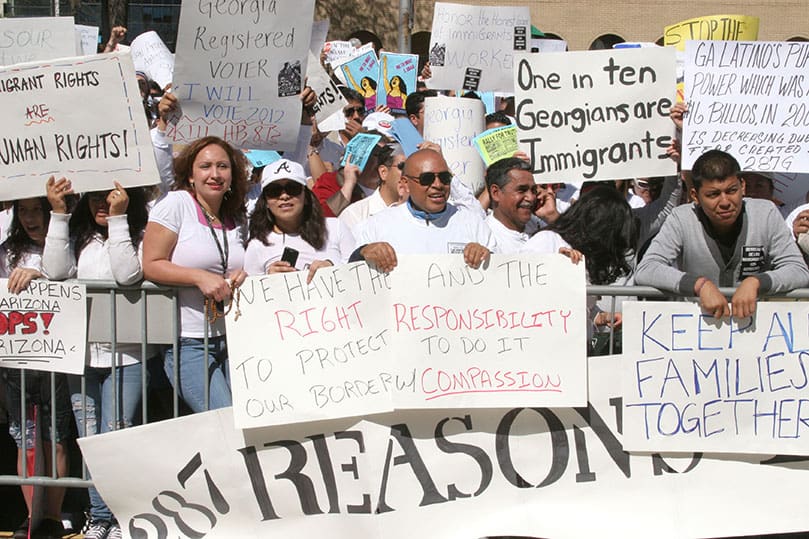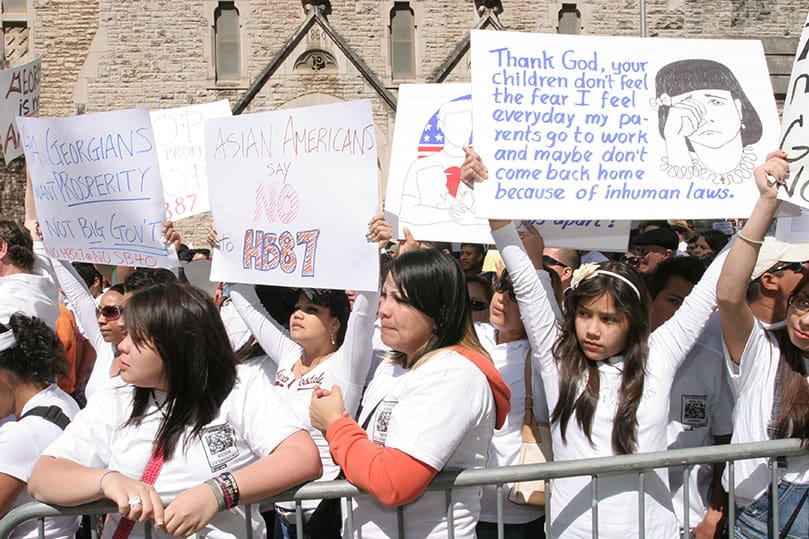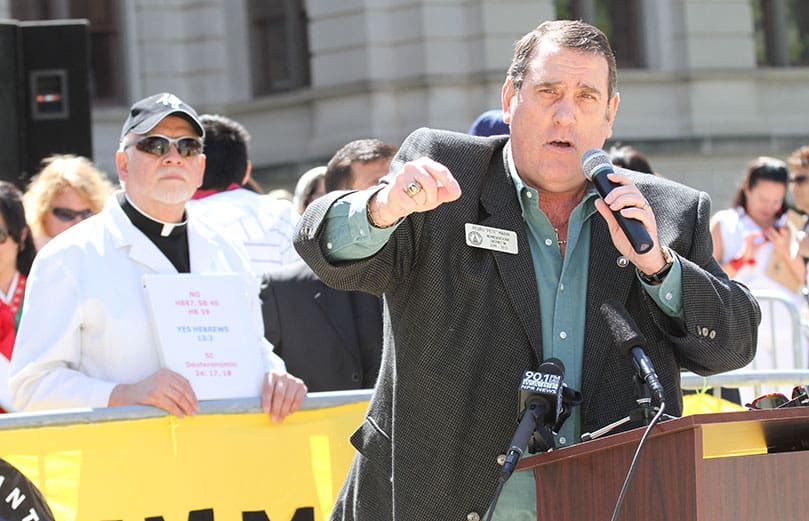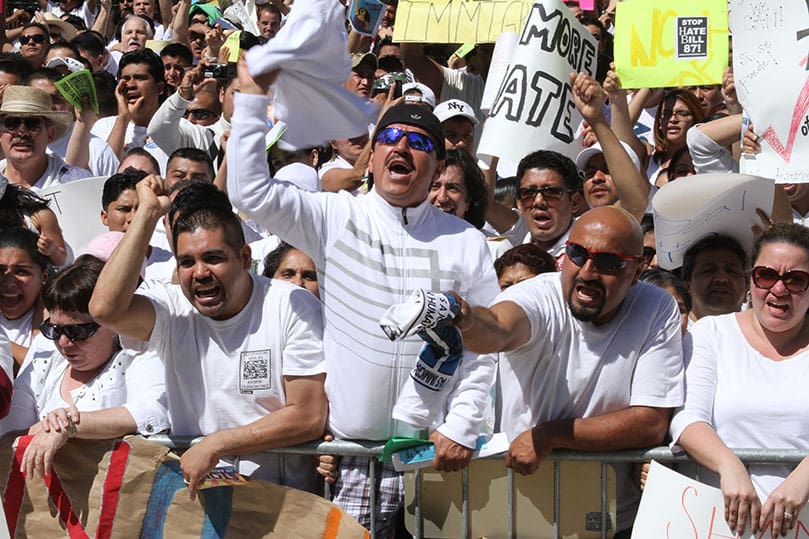(Starting third from the left) Esmeralda Orozco, Nora Soto and Miguel Orozco of Our Lady of the Americas Mission, Lilburn, hold their sign among the thousands of protestors on hand voicing their opposition to House Bill 87 and Senate Bill 40. The March 24 immigration rally took place in front of the Georgia State Capitol. Photo By Michael Alexander
Atlanta
Immigration Debate Brings Thousands To Capitol
By ANDREW NELSON, Staff Writer | Published March 31, 2011
Catholics were among the thousands that filled the streets surrounding the state Capitol in opposition to proposed laws targeting illegal immigrants. Critics say the proposals will weaken the state’s economy and lead to racial profiling.
The crowd railed against two bills—House Bill 87 and Senate Bill 40.
The protesters held signs like “The pilgrims were undocumented” and “No human being is illegal.” Throughout the rally, the crowd chanted in Spanish: “Yes, we can!”
Nora Soto, 35, who is in school to learn hairdressing, spent Thursday, March 24, on Washington Street, in the shadow of the Capitol’s gold dome. She worships at Our Lady of the Americas Mission in Lilburn.
“It’s going to separate families. It’s not fair. We came here to work and find a better life,” said Soto, who has lived in the United States for 20 years.
Soto was one of a reported 6,000 people at the rally, which featured musicians, priests, political leaders and activists.
The proposals would broaden the powers of local police to enforce immigration laws and would require businesses to use an online verification system when hiring. The bills would also create criminal penalties for assisting people who are in the country illegally.
Each bill has passed in the chamber where it originated. A compromise measure is expected to take shape in the final days of this legislative session.
Georgia isn’t alone in trying to deal with illegal immigration. According to the National Conference of State Legislatures, in 2010, 46 states and the District of Columbia enacted 208 laws dealing with immigration and refugees.
An upswing in Latino immigrants—both legal residents and undocumented workers—has kept the issue alive. The 2009 American Community Survey counted 735,125 Hispanic residents in Georgia, which is a 69 percent increase since the 2000 census. But overall, Latinos make up a small percentage of all residents, about 8 percent of the state’s population of over 9 million.
At the same time, the state has the seventh-largest population of illegal immigrants in the country, numbering some 425,000, according to the Pew Hispanic Center.
Heidi M. Tauscher, director of parish and social justice ministries for the Atlanta Archdiocese, called the proposed law “harsh.”
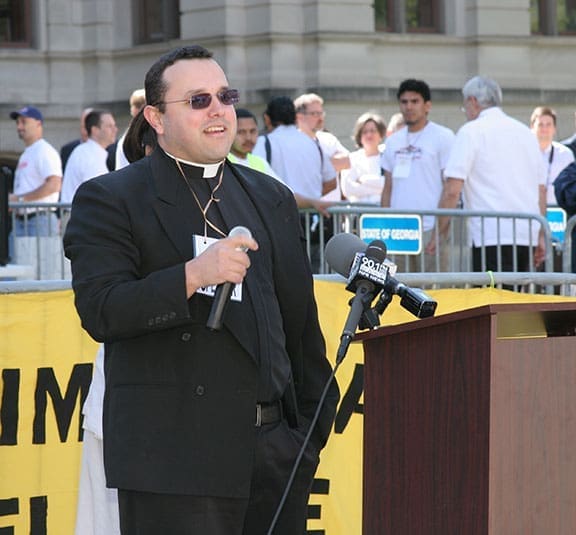
Father Carlos Vargas Silva, parochial vicar at St. Andrew Church, Roswell, and a native of Colombia, South America, addresses the crowd of thousands during the immigration rally in downtown Atlanta. Photo By Michael Alexander
“The bill adversely impacts all of us because of the way immigrants here today serve our interests, economically, physically. They perform valuable service. They harvest our crops. They clean our buildings; they service our equipment. If they are discouraged from staying or forced to leave, we are the ones that are going to suffer,” she said.
Parishioners and ministries that care for the poor and the marginalized may face obstacles if the law is enacted, she said. The proposed law penalizes people who “transport,” “harbor” or “entice” illegal immigrants, which ministries may unknowingly do, she said.
“They have to now worry they could be caught up in the net,” she said.
Despite a provision in the bill that says otherwise, some people will be impacted more than others, Tauscher said.
“If you are an immigrant, or if you look like an immigrant, you are most likely going to be impacted much more severely than somebody that doesn’t share the same appearance,” she said.
Georgia lawmakers sponsoring the House version of the bill issued a statement after the rally that read, “There are millions of Georgia citizens working and raising their families who no longer are willing to accept the loss of job opportunities to the nearly 500,000 illegal aliens in our state or to subsidize their presence with their hard-earned tax dollars.”
A broad number of groups oppose the legislation, from human rights groups to business leaders, the Georgia Farm Bureau and religious organizations.
U.S. Rep. John Lewis, a Democrat, urged the crowd to fight the proposals. He said during the civil rights movement he was arrested 40 times to protest Jim Crow laws and fighting immigration laws may require people to get arrested. Immigration law needs to be handled by the federal government, not on a state-by-state basis, he said.
Georgia’s Catholic bishops issued a statement in early March that urged state lawmakers to “be part of the solution to (immigration) challenges, not create more division.”
The religious leaders called on “Georgia state representatives to resist the imposition of harsh and unnecessary legislation affecting all residents of Georgia, further tearing apart the fabric of our communities and jeopardizing our future.”
Frank Mulcahy, executive director of the Georgia Catholic Conference, said legislators would likely debate the proposals soon. In the end, the decision may come down to Gov. Nathan Deal, who endorsed strong immigration controls during last November’s election, he said.
“He’s coming to realize the issue is not that simple. There can be costs to the state of Georgia if the legislation passes,” he said.
The church stands with a lot of different groups opposing the bill and there is a broad coalition of people and groups opposed to it, he said.
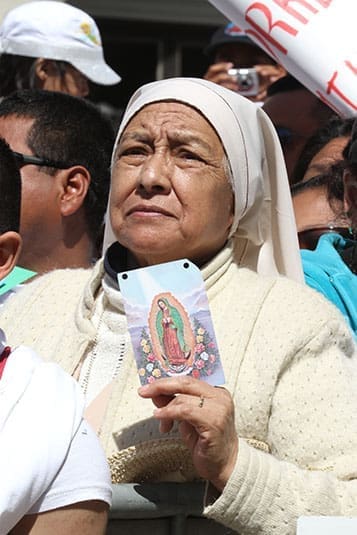
Missionary Sister of the Sacred Heart Veronica Ramos holds an image of Our Lady of the Guadalupe in her hand as she joins the March 24 immigration rally. Photo By Michael Alexander
“It leaves a lot of people vulnerable,” he said.
Several pastors and priests joined their parishioners at the rally to show their support.
Father José Duván Gonzalez, pastor of St. Bernadette Church in Cedartown, spoke at the event.
“They are very afraid. They are in panic. They are very, very afraid. If the laws are approved, they will be in the basement,” he said about parishioners.
Speakers warned the state would take a financial hit if individuals or organizations boycott the state if the legislation becomes law.
Protesters said people arguing for the tough laws have the wrong idea of the dreams of illegal immigrants.
“They need to know us,” said Soto.
“We are not the people they say we are. They think we came here only to have children and to take money away. We came here to work and to get a better education,” she said.
A house cleaner, Lina said, “We want a better life for the children. It’s not about us.”
Tears rolled down her cheeks as she talked about her fear for her children. Lina, who attends Our Lady of the Americas Mission, gave only her first name because she said she is not in the country legally. A native of Colombia, Lina is a mother of two, has lived in the country for a dozen years.
“For us, it’s a sacrifice because we want a better life for our children,” she said, in Spanish.
“We need to help each other and support each other,” she said.
